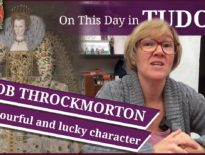On this day in Tudor history, 23rd February 1601, religious pamphleteer and Member of Parliament, Job Throckmorton, was buried at Haseley in Warwickshire.
Job was known for his alleged involvement in the "Marprelate Controversy", a pamphlet war, and also for his colourful Parliamentary speeches, which nearly got him into trouble. He was lucky to escape imprisonment and worse!
Find out more about Job Throckmorton in today's talk.
Also on this day in Tudor history, 23rd February 1554, Henry Grey, Duke of Suffolk, father of Lady Jane Grey, was beheaded. Find out more about what led him to his end, and also hear a story about his mummified head, in last year's video:
Also on this day in history:
- 1503 – Burial of Elizabeth of York, Queen Consort of Henry VII and mother of Henry VIII, at Westminster Abbey.
- 1512 – Birth of William Framyngham, scholar and author, at Norwich, Norfolk. Unfortunately, his works are lost, but his friend, Dr John Caius listed seven of his works, which included heroic verse, a poem in pentameters and hexameters, a poem on idolatry and two books of prose.
- 1525 – Start of the Battle of Pavia during the Italian Wars of 1521-1526. The imperial troops of Charles V defeated those of Francis I and Francis I was captured, imprisoned and forced into signing the Treaty of Madrid.
- 1533 – Death of James Denton, Archdeacon of Cleveland and Dean of Lichfield, at Ludlow. He was buried in St Lawrence's Church, Ludlow. Denton had also been Chancellor to the Council of Princess Mary.
- 1574 – France began the fifth Holy War against the Huguenots.
- 1628 – Burial of John Guy, politician, colonist and Governor of Newfoundland. It is said that he was buried in St. Stephen's Church, in his home-town of Bristol, but there is no record of his burial there.
Transcript:
On this day in Tudor history, 23rd February 1601, religious pamphleteer and Member of Parliament, Job Throckmorton, was buried at Haseley in Warwickshire. Job was the eldest son of Clement Throckmorton of Haseley, Warwickshire, and his wife, Katherine Neville.
It is believed that Throckmorton was one of the men responsible for the “Martin Marprelate tracts”. These religious tracts, which attacked the established church, were written under the pseudonym Martin Marprelate (and his sons) and published in 1588 and 1589 by John Penry and Robert Waldegrave. In his article on Throckmorton, Patrick Collinson, writes that a comparison of Throckmorton's 1549 work, “The Defence of Job Throkmorton Against the Slaunders of Maister Sutcliffe”, with the Marprelate satires “has persuaded modern critical opinion that if these satires had a single author, that author was Throckmorton”, although Throckmorton denied it. Other names linked to the tracts include the publisher John Penry, Sir Michael Hicks, Henry Barrow, Roger Williams, and George Carleton.
“The Marprelate Controversy” was a pamphlet war between the writers of the Marprelate tracts and defenders of the Church. It had been sparked off by a Star Chamber decree, championed by John Whitgift, Archbishop of Canterbury, which forbade the publication of any books, pamphlets or tracts which had not been authorised by the archbishop, or his colleague, the Bishop of London. This allowed Whitgift to suppress Puritan works, which he viewed as heresy. In response to the Archbishop’s censorship, Martin Marprelate and sons printed a series of tracts using private printing presses. These tracts attacked certain bishops and the church as a whole, and included “The Epistle”, “The Epitome” and “Certain Mineral and Metaphysical School-points”. Tracts were written in answer by church defenders including Thomas Cooper, Bishop of Winchester; writer and playwright John Lyly, writer and playwright Thomas Nashe, and dramatist Robert Greene.
Although Job was tried in 1590 after being implicated in the Marprelate Controversy, he pleaded “I am not Martin, I knewe not Martin”, and, thanks to his status, escaped punishment. His colleague, John Penry, however, wasn’t as lucky and was hanged.
Job is also known for what Patrick Collinson describes as his “extraordinary parliamentary speeches”, such as when he denounced Mary, Queen of Scots as “the daughter of sedition, the mother of rebellion, the nurse of impiety” and his attacks on England’s Catholic neighbours which included him calling James VI of Scotland “the younge impe of Scotlande”, for which William Cecil, Lord Burghley, had to apologise to the Scottish ambassador and promise to imprison Job in the Tower. Job escaped imprisonment, though.
Job Throckmorton seems to have been quite a colourful and lucky character.



Flight in Tardis with note to Henry Grey, don’t take part in the Wyatt rebellion. Take up fishing instead.😂
Ha! Yes!